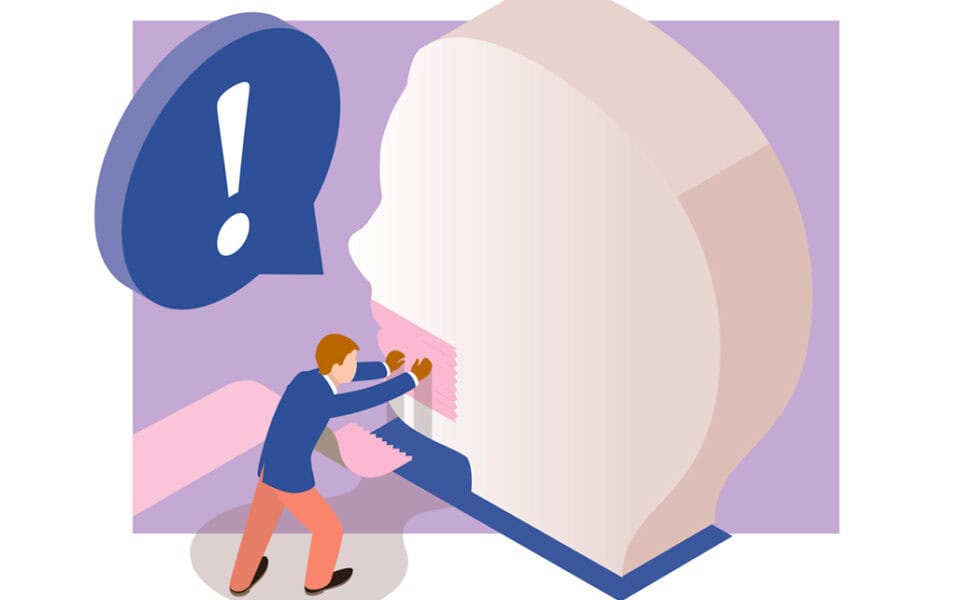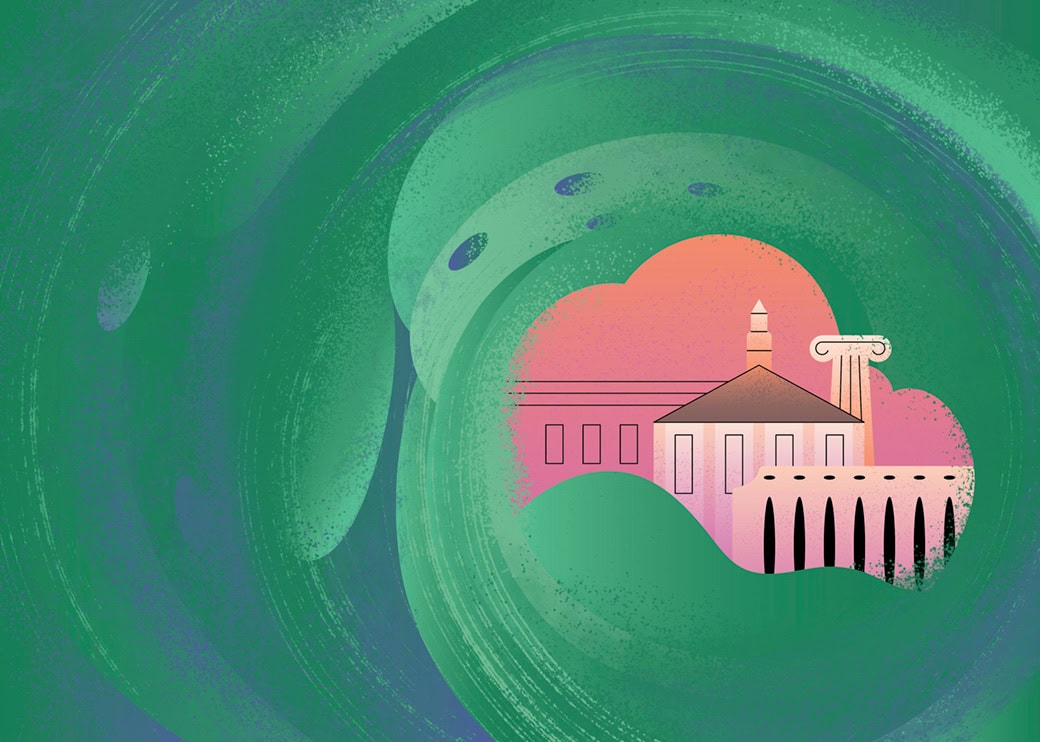
Fragile freedom
The Trump administration is cutting research funding and compiling lists of banned words. But Europe is not free of threats against science either.
Text terhi hautamäki iIllustration Anna-Kaisa Jormanainen / Images Bengt Sigvardsson / English translation Marko Saajanaho
We live in a time during which the President of the United States calls a top university a “joke”, has withheld funding from it, attempted to stop it from admitting foreign students, and tried to interfere in its teaching practices.
The National Science Foundation (NSF) has cancelled over one million US dollars’ worth of grants. Most of the cancelled projects contain keywords related to diversity, equality and inclusivity.
This April, over 150 rectors of higher education institutions in the United States released a statement condemning the “unprecedented government overreach and political interference”.

This statement aside, universities have capitulated to the government in a concerning manner. Funding cuts serve as an effective intimidation tactic. The American Association for the Advancement of Science (AAAS) estimates that federal funding for basic and applied research will decrease by over a third next year.
For example, the Columbia University agreed to Trump’s “deal” involving the university paying 200 million dollars in compensation for their alleged failure to stop antisemitism. Large-scale demonstrations against Israel’s hostilities in Gaza have been organised at the campus. The university agreed to review their Middle Eastern Studies programme and make management changes in the department.
Longtime criticism in the US
The attack on science is part of Trump’s backers’ larger goal of pushing for ultimate executive power for the president, says Mikko Saikku, McDonnell Douglas Professor of North American Studies at the University of Helsinki.
Longtime criticism and a climate that has increasingly polarised in recent years are smouldering in the background.
“It is tragicomical how the Republicans were so very concerned over freedom of speech at universities during Biden’s term – partially for a reason, because there were some overreactions. However, the transfer of power has brought along these lists of banned words, which conflict with the core principles of scientific freedom.”
”The polarisation of society has been fierce, and there is little room for those in the centre.”
Mikko Saikku, McDonnell Douglas Professor of North American Studies, University of Helsinki
Saikku notes that conservatives have long been critical towards the Ivy League universities. Many are asking if these considerably wealthy institutions should be supported with tax money. Since the 50s, Republicans have pondered whether universities lean towards the left. Since the 60s, there has been discourse about positive discrimination with underrepresented groups receiving preferential treatment in student admissions, something the Supreme Court banned in 2023. Some universities have proposed staff bonuses based on ethnicity.
The discourse climate has become uncompromising. Of course, those conservatives that complained about threats to freedom of speech have taken it upon themselves to take the smothering of freedom of speech to new heights.
“The polarisation of society has been fierce, and there is little room for those in the centre.”
Funding cuts and attempts to control have scared researchers. According to Saikku, a brain drain to Europe and Canada is ongoing. Saikku himself has been contacted by American researchers as well.
“The situation in the US is a cautionary tale for us as well, but few European countries have an equally president-driven system in place. For the time being, the Republican majority in the Congress has remained silent and let the president make himself busy.”
According to Saikku, it will be interesting to see the reaction especially in Republican majority states when the cuts come into effect. These cuts also affect regular public universities, which are important job creators in their states.
Reflecting on Europe
The turmoil in the American scientific community also reflects on European higher education institutions.
Tampere University Professor of English Philology Päivi Pahta is a board member of ALLEA, the European Federation of Academies of Sciences and Humanities. In February, ALLEA published a statement expressing their serious concern over the increasing threats to academic freedom in the US and elsewhere.
“At the time, it was predicted that university cooperation and student and research exchanges to the US would become more difficult. Researchers from some countries have already been barred from entering the country or turned back”, Pahta says.
”Researchers from some countries have already been barred from entering the country or turned back.”
Päivi Pahta, Professor of English Philology, University of Tampere
A clear example of this is the Fulbright scholarship programme, which has been heavily downsized. The Finnish News Agency STT reported that doctoral researcher Saara Loukola’s grant request for a data collection trip, with the intention of studying methods used by American teacher training to address racism, was denied.
Hufvudstadsbladet reported that the Trump administration tried to pressure the University of Helsinki to remove words from press releases about the partially US-funded scholarships.
Europe has also seized the opportunity: both the Commission and the member states have started programmes to attract researchers from the United States.
“The desire to look elsewhere is likely most prevalent amongst American researchers with immigrant backgrounds, who feel their academic careers are not secure”, Pahta says.
The Academy of Finland has an ongoing funding call worth 50 million euros to recruit international researchers. While this funding is not specifically intended for recruiting from the United States, this possibility was mentioned specifically in the Academy’s press release.
“The funding call is part of the Profi funding, which is already part of the Academy’s regular palette, and this call would have taken place this year regardless. Of course, the international situation affected the allocation of this funding”, says Päivi Tikka, Academy of Finland Head of Programme and Research Infrastructure Funding.
Finland fell in the Academic Freedom Index
The state of science is a concern outside the United States as well. According to the 2025 Academic Freedom Index, academic freedom has declined significantly in 34 countries. These include several European countries such as Greece, Portugal, Germany, Austria – and Finland.
The year before last, Finland placed 9th in the Index but is now found in 47th. Out of all EU member states, political control of science is tightest in Hungary. While Italy also has a right-wing populist government, no notable changes to the state of science have been reported, and Italy ranks 24th in the Index.
Pahta says different European countries are facing similar problems – wanting political control and reining in research.
“Authoritarian, extreme conservative and all ‘extreme’ politics in general want to restrict science. Of course, we have our own examples, at least of attempts to influence at a political level”, Pahta says. As one example, she mentions the postponement of strategic research’s immigration theme.
”Authoritarian, extreme conservative and all ‘extreme’ politics in general want to restrict science. Of course, we have our own examples, at least of attempts to influence at a political level.”
Päivi Pahta, Professor of English Philology, University of Tampere
According to Pahta, academic freedom can also be restricted by management actions in scientific organisations, particularly the phasing out of certain humanities and social sciences fields that can be seen all over Europe, as well as thinking that emphasises the immediate benefit of science and affects funding allocation. An individual university can justify these as strategic choices, but when the same trend is growing everywhere, it narrows the scope of research.
“In addition, a culture of silencing is evident in various countries, with fierce social media attacks against specific researchers or subjects deemed unnecessary.”
Friedrich-Alexander University of Erlanger-Nuremberg Professor Katrin Kinzelbach is one of the authors of the Academic Freedom Index 2025 report. She explains there is no singular reason for Finland falling down the ranks, but instead there is a decline in multiple areas. Despite this, Finland belongs in Status Group A, meaning full academic freedom.
For example, the Netherlands has fallen to Status Group B, in which science is considered “mostly free”. Academic freedom in the Netherlands has declined due to campus unrest and suppressing demonstrations. Police has forcibly broken up students’ Palestine demonstrations. The Royal Netherlands Academy of Arts and Sciences (KNAW) has also criticised the government’s intentions to interfere in university study language selection and plans to screen staff and students working on “sensitive information”.
Chaos at Serbian universities
Serbia is a country where the relations between the government and universities have become strained to the extreme. Since late last year, students have been protesting against the government. The Serbian Progressive Party (SNS), in power since 2021, has tightened its grip on government institutions and media while corruption has increased.
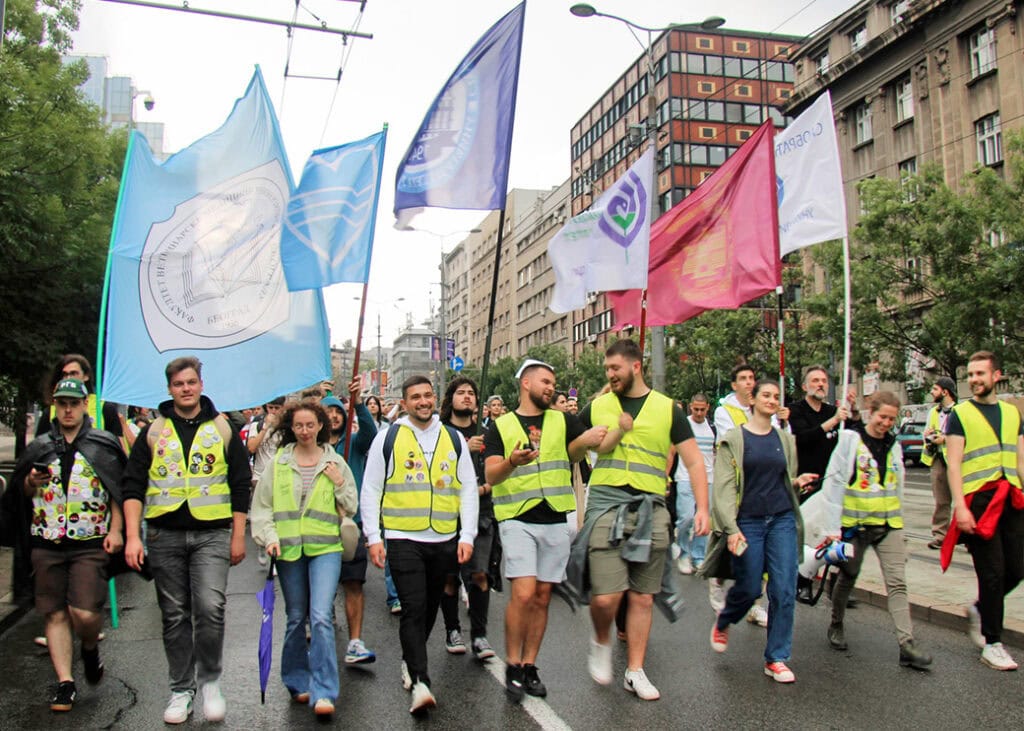
The protests were sparked by an accident in November involving a recently renovated roof of a train station collapsing in the city of Novi Sad, which claimed sixteen lives. This accident was believed to have resulted from corruption and lack of oversight. Students have taken over faculties, and lessons have been interrupted. University personnel widely support the protests.
“The students are very organised and strong, making them a difficult target for the government. Because of this, it has recently targeted university professors instead”, says Novi Sad Academy of the Arts Professor Vladan Joler in an interview conducted on 19 May by Swedish journalist Bengt Sigvardsson.
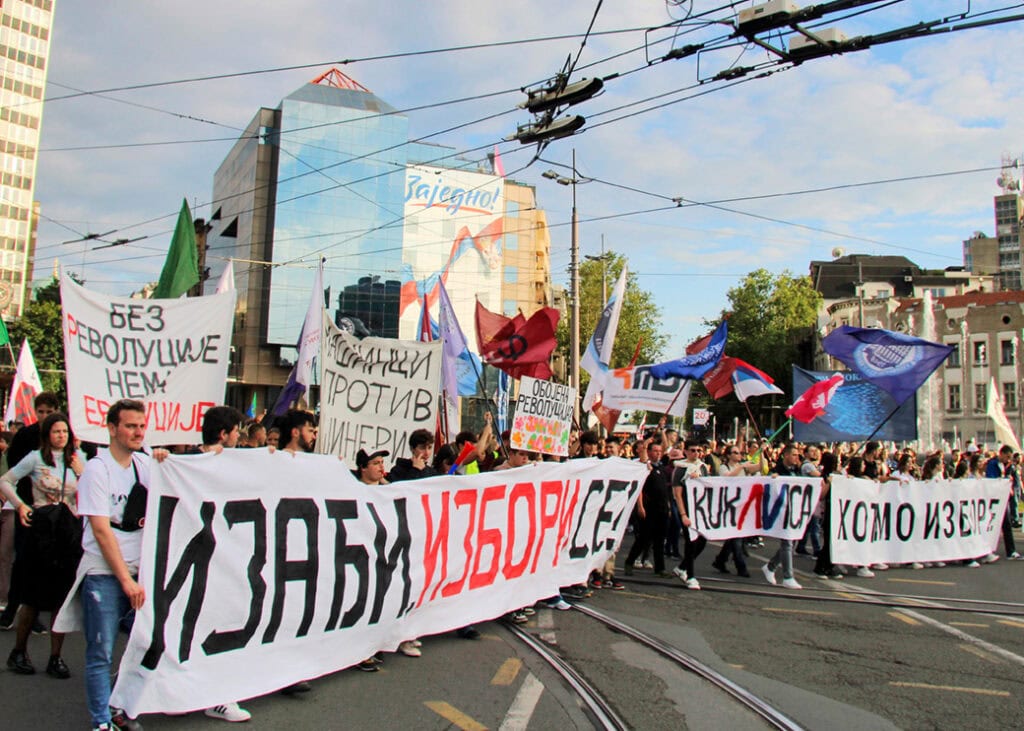
The government has interfered in the work of university staff: in March, it mandated weekly working hours that include five hours of research and 35 hours of teaching.
It has been impossible to avoid encountering a protest or barricaded street in Novi Sad this year. At university doors, students check everyone trying to get inside. The largest demonstration was held in Belgrade in March, with approximately 300,000 participants.
According to University of Belgrade Associate Professor at the Faculty of Law Vanja Bajović, the government has appointed party loyalists in faculty councils and student organisations. However, a significant number of university personnel oppose the government’s policies. Bajović was a member of a commission set up in the university to determine whether student demands had been answered. The commission conducted its report with integrity and experienced backlash.
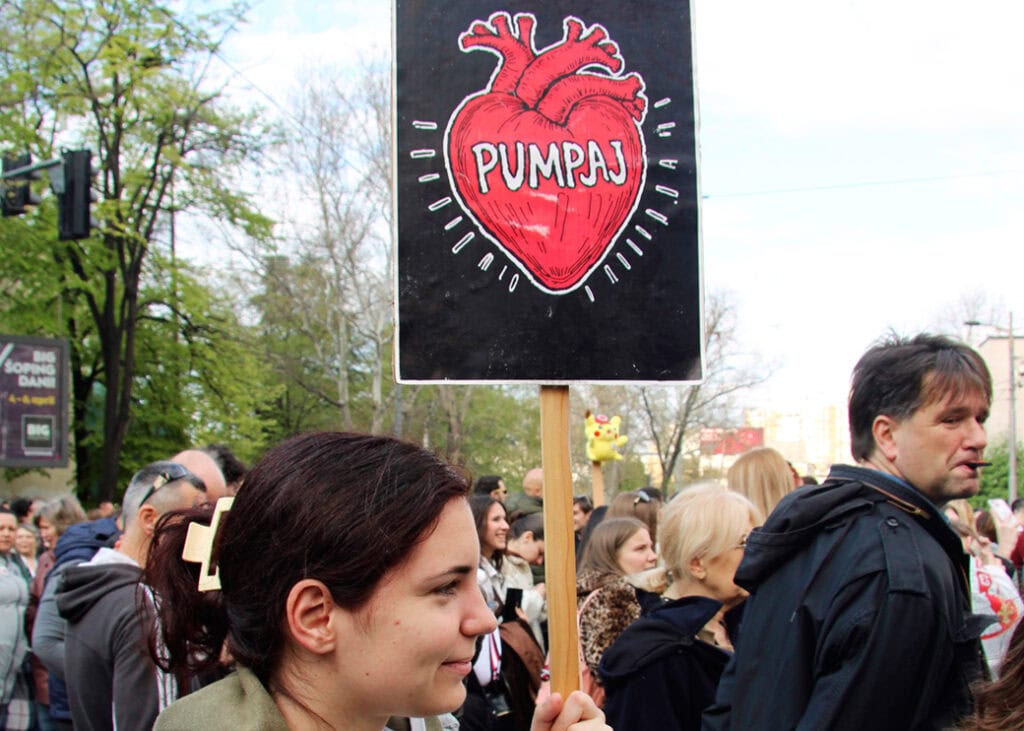
“The government assumed we would lie, but we have integrity. We can’t claim there are public documents if such documents do not exist, or that criminal processes have been started if they have not”, Bajović said in her interview with reporter Sigvardsson.
Bajović fears that should the protests be extinguished, the government will go even further and university staff may be laid off for political reasons. Some of her colleagues are already considering other jobs.
Role of researched information declining
A proper discussion about academic freedom is long overdue in Finland as well, and it cannot be taken for granted, says University of Helsinki Media and Communications Professor emeritus Esa Väliverronen. According to him, the status of science in Finland differs from the other Nordic countries.
The government has reduced the use of expert knowledge in decision-making. The Finnish Government’s analysis, assessment, and research activities (VN TEAS) are being shut down. The government has proposed shutting down separate climate and environment panels, combining science panels and forcing them under the authority of the Prime Minister’s Office. Previously, the government proposed additional legislation stating that the activities of the Academy of Finland must not be in opposition to the Finnish foreign and security policies.
“In Sweden, their right-wing government started a project to improve academic freedom. In Finland, the government has mostly sought to increase political control instead.”
According to Väliverronen, academic freedom is also undermined by cuts in independent research funding, decreased autonomy in the scientific community, and threatening and harassing researchers.
“While harassment may not necessarily affect research directly, it does affect researchers daring to voice their opinions and appear as experts in public.”
According to Väliverronen, methods for improving academic freedom must be sought through cooperation between organisations. The international situation should be taken seriously.
“Personally, I have speculated whether the post-World War II period of Big Science is coming to an end. Thus far, a social contract has determined that the state funds science and lets universities choose what to study and how, and this benefits everyone.”
Source:
Information about the situation in Serbia: Interviews conducted in Serbia and article written by Swedish journalist Bengt Sigvardsson.
Higher education institution activities hurt by cuts
High quality independent research is ensured by sufficient funding. In Finland, funding is inconsistent – research and development expenses are increased through a parliamentary decision whilst core funding is being cut.
In its mid-term session this spring, the government allocated budget cuts totalling nearly 120 million euros by 2028. The core funding of universities will be cut by 56.2 million euros next year. Despite previous fears to the contrary, no additional cuts were decided in the autumn’s budget negotiations. University research activity receives 20 million extra euros, with 2.6 million euros more for starting places. Thus, university core funding will be reduced by 33.6 million euros in 2026.
The government continues to commit to increasing R&D spending to 4 percent of the GDP. The amount of public funding is 1.2 percent. Because the funding is tied to the GDP and it has not developed as hoped, the government will reduce the increase in R&D spending in the next two years.
The budget framework press conference promised a €100 million investment in additional starting places, a promise repeated by the government in September, but we are still waiting to hear about its practical implementation.
The Council of Rectors of Finnish Universities (Unifi) stated this spring that the cuts to core funding reduce the effectiveness of the R&D funding, because universities operate as entities: teaching is based on research, and the staff both research and teach. In relation to student numbers, the funding is already 20 to 30 percent lower than in Sweden, Denmark, or Norway.
University of Helsinki Head of Administration Esa Hämäläinen wrote on the university’s website that additions to R&D funding do not compensate for core funding cuts. Despite the increase in funding from the Academy of Finland and Business Finland, core university operations cannot be run on project funding.
